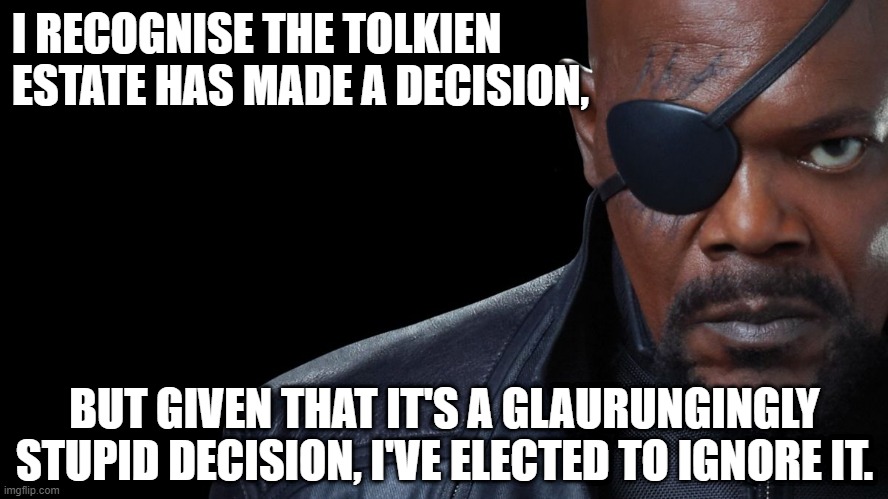Subject: Not a lawyer, but I am a regulatory chemist.
Author:
Posted on: 2022-03-07 11:03:55 UTC
That means part of my job is trying to work out exactly what this sort of document allows us to do, and: hoooooo boy this is badly done.
Here's what I think they're trying to say:
- The name 'TOLKIEN', and the JRRT logogram, are trademarks of the Estate. If you call your company "Tolkien Embroidery", or use the logogram in your logo, you're implying that you are officially approved by the Estate, and could draw trade away from the Estate, thus violating their trademark.
- Things made by JRR and Christopher Tolkien, including the text of the books and the Professor's art, are copyright. The Estate upholds that copyright, and thus has the exclusive right to copy and distribute these works. If you reproduce or attempt to sell chunks of the work without authorisation, you would be violating copyright.
- Therefore, don't try to sell things with the name on it or using big chunks of the Professor's works.
This is entirely reasonable! A bit heavy-handed, but within their rights. I think it's dumb to ban fanzines and festivals from calling themselves "Tolkien Such-and-such", but if they've registered the trademark they can do it.
But here's what they've managed to write instead:
- Any map of Middle-earth is by definition a copy of Tolkien's, and thus copyright.
- Using any characters, places, or events from Tolkien, in any written context, is copyright.
- Any use of the Elvish languages or scripts is copyright.
- Use of Tolkien quotes or Tolkien's pictures, or the trademarks, in pictoral artwork is copyright/trademark.
- Using any Tolkien quote for any reason requires permission.
- Setting any of Tolkien's words to music is copyright.
- Streaming yourself reading Tolkien violates copyright.
This falls across a spectrum from the usual fanfic grey area, to an insanely strict interpretation of copyright that I'm positive wouldn't hold up in court. They clearly know this - the only time they talk about taking action is in a commercial context, elsewhere they just don't give permission.
But that's not all.
Even if they were within their rights to do what they've written (which I don't think they are), they've written it so badly, because... what do they mean by "publish"? Are they using the common-use term ("print and sell for profit"), or the specific legal term ("make available to the public")? The context strongly suggests the former: they use the phrase "publish fan fiction or other books", and talk about "any form of publication", implying a concrete object. But the structure of their answers assumes the latter.
- They jump straight from "publish fanfiction or other books" - which implies commercial publication - to "you can't create materials referring to the characters". Is there an implicit "and publish it" in there? I would argue yes; Eru knows what they'd say.
- For the languages and scripts, the cases they consider are "private interest and amusement", "publication", and "in connection with any group activity".
- Given their draconian phrasing on fanfic, they're bizarrely lenient on merchandising. By the text of the FAQ, I would be absolutely fine to sell a text-free fan-comic covering the entirety of LotR in minute detail - but as soon as I wrote the words "The Lord of the Rings" on the cover, I would be in violation of copyright. That... can't be what they want to be doing, right?
It's just... really badly written.
Also, they seem to have provided the personal (company) email address for Amazon's head of global publicity, rather than a group email like a sensible person would. I'd hate to be Courtney Brown right now.
hS

